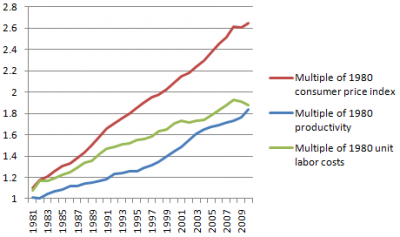I have a little graph to share with you today:(created from data collected by the U.S. Department of Labor)

Some friends and family were speculating recently about how much harder we seem to be working these days.
This is just one more example of how interconnected our spiritual lives are with politics and economics.
Imagine two people:
- The first works hard and productively, but not hard enough to cause undue stress. He or she has time and energy to devote to family and to community: to contribute in ways other than work, to develop healthy relationships, donate time to charity, spend some time in relaxation and self-enrichment.
- The second must work so hard, and with such stress, that she or he comes home exhausted, hardly able to deal with the problems of a private life, and is not compensated enough to relieve any of the private stresses which come from having month left over at the end of the money.
Which of those two is most likely to be a superior spouse or parent? Which is more likely to grow spiritually as a human being, which will be a better neighbor, or citizen?
The economics of our lives have spiritual consequences.
Currently, Americans are working harder than ever before, some of us handling jobs that used to belong to two or three people.
For more on this topic, including more cool graphs, check out Monika Bauerlein and Clara Jeffery's article at Mother Jones.
The above chart provides some insight into why this is, and why we should be concerned.
The blue line represents the change in the last thirty years or so, in productivity: a measure of how hard and smart the middle class has been working.
You'll notice that productivity has almost doubled in that period; we're now making twice as many bricks from the same amount of straw.
The green line represents the change in cost of labor: how much we've been getting compensated.
At first glance, it seems almost fair. We're earning almost twice as much for those bricks. and we're getting paid almost twice as much.
There are lots of qualifications I could add to that picture, but for now let's just go with it, and consider the red line.
The red line represents the accumulated growth in the consumer price index, the change in what it costs to live.
That, as you can see, has grown well over two and a half times during the same period.
So, while we've been working twice as hard, and earning twice as much, inflation has grown even faster—so we are working twice as hard, but not getting twice as much buying power.
How can this be?
Shouldn't an increase in productivity be making us all richer?
Imagine, for a moment, that you lived in a company town: a town which was completly owned by one person.
Imagine that there is only one store you are allowed to shop at, also owned by that same person.
Imagine that the rent you pay goes to that person as well.
And also imagine that you work for that same person.
One day you realize that you have, through a combination of brains and very hard and stressful work, nearly doubled your productivity, bringing the company a tremendous increase in profits.
You also realize that your pay has increased at a comparable rate to your productivity, which seems to mean that the company, and its owner, have rewarded your hard work.
But you find that your bank account is still near zero, or perhaps you even owe more than you own, and that the big picture seems not to have changed at all, in spite of your dedication and labor.
Prices at the town store, and the rent on your room, have increased even faster than your productivity and wages.
You are working harder for less.
And you begin to wonder where all the wealth you created went to...






